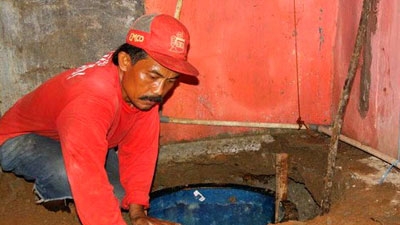Jakarta, March 22, 2013 – A few years ago, Warga was a farmer in Ponggang Village, West Java, Indonesia. Now he's a fledgling entrepreneur producing sanitation facilities. He makes healthy toilets and septic tanks, and helps install them.
“I am very happy with my life now. Not only has my new business boosted my family income, but I am also helping make my village become healthier,” Warga said proudly.
With the sanitation facility business growing in his village, Warga and the people in his community hope that their village will soon be open defecation free.
Sanitation entrepreneurs provide local solutions
Warga is one of many sanitation entrepreneurs who have started their own business with the support of the World Bank Water and Sanitation Program (WSP). The program is expanding their outreach to entrepreneurs seeking to provide affordable sanitation facilities. Since an increase in advocacy activities, interest has also intensified.
The sanitation entrepreneurs receive training in producing facilities, as well as assistance in obtaining credit also support from local banks and links to markets. They then provide a one-stop service for the community’s sanitation needs, which include installing household sanitation facilities and help in facilitating credit for payment.
There remains lots of room for potential for this enterprise. WSP estimates that 100 million people in Indonesia lack proper sanitation facilities, and as many as 66 million still practice open defecation.
With many villagers citing cost as a deterrent to better hygiene, providing affordable sanitation facilities is key in tackling open defecation. Locally produced sanitation facilities are cheaper than existing models. For each household, a complete set range from Rp 550,000 to Rp 1,2000,000 (US$ 55-120).


